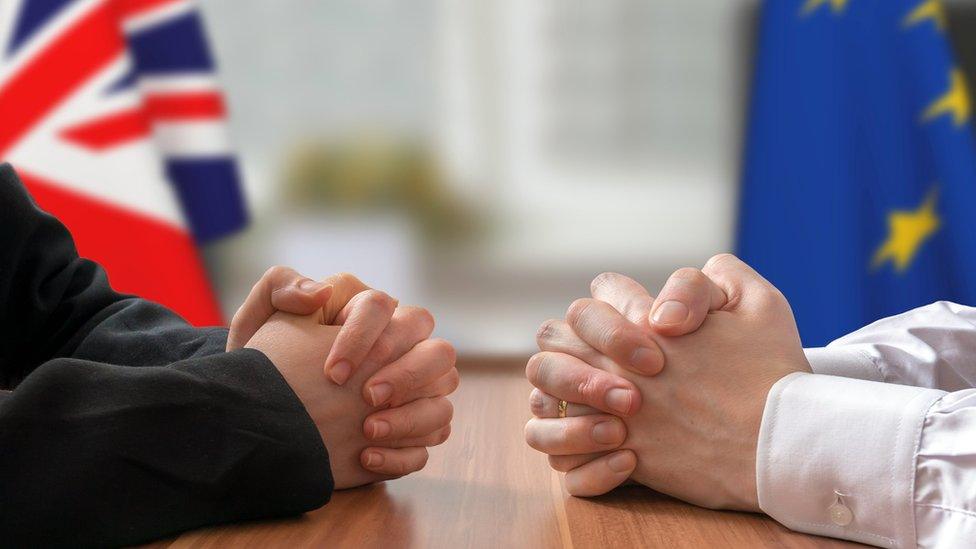Brexit: EU drafts trade deal ahead of talks with UK
- Published
- comments

The EU has drafted a post-Brexit trade deal proposal, covering areas such as security, foreign policy and fisheries.
The 441-page draft legal text, seen by the BBC, was sent to the 27 EU states on Thursday night, ahead of being presented to the UK next week.
But the BBC's Adam Fleming said much of the draft will be rejected by the UK because of references to EU law.
The two negotiating teams were due to meet in London for talks, but that has been cancelled due to coronavirus.
A joint statement from the UK and EU said they were "exploring alternative ways to continue discussions", such as video conferencing.
The UK left the EU at the end of January and entered the so-called transition phase, where the country continues to abide by most of the bloc's rules while a trade deal is negotiated.
Boris Johnson has said if an agreement is not made by the end of 2020, the UK will leave without one and go on to World Trade Organisation rules.
But critics said such a move would be the equivalent of a "no deal" Brexit and would damage the UK economy.
Cabinet minister Michael Gove has also said the government could walk away from talks as early as June if a "broad outline" of a deal has not been agreed.
Asked if that position could change due to the threat of coronavirus outbreak causing delays, the PM's spokesman said the transition period would still end this year, adding: "In UK law, a request for an extension is not possible."
'Level playing field'
The draft legal text, called the "New Partnership between the European Union and the United Kingdom", was drawn up by the European Commission.
The document includes a lot of blank sections and placeholders.
But it also makes a number of proposals, including:
A joint partnership council with 16 subcommittees, including one dedicated to the so-called "level playing field"
Level playing field proposals on competition, taxation, labour and social protection, and the environment
Long term agreements over access to British waters for EU boats, with annual negotiations
Co-operation on data exchange and extradition, if the UK continues to implement the European Convention on Human Rights
The EU's chief negotiator Michel Barnier said the text "shows [an] ambitious and comprehensive future relationship is possible", adding: "We must give ourselves every chance of success."
But the UK government has already said it would not accept any alignment with EU laws as they are updated.
It has also rejected the EU's call for "level playing field" guarantees - where British companies would be given tariff-free access to the EU market if they do not undercut their rivals within the bloc.
However, the EU has repeatedly warned that the UK cannot expect to enjoy continued "high-quality" market access if it insists on diverging from EU social and environmental standards.


The British negotiating team will take a red pen to large sections of this EU draft treaty.
They reject the idea of the deal referring to specific European laws.
They don't want the words "European Court of Justice" to appear anywhere.
And the proposal on fishing will be seen as limiting the UK's control of its own waters.
It will be worth scrutinising the text carefully, as there are lots of more technical areas of agreement that could form the basis of an eventual deal.
However, the two sides disagree on whether there should one big blockbuster deal or several smaller ones - and that's an argument that's potentially unsolvable.
